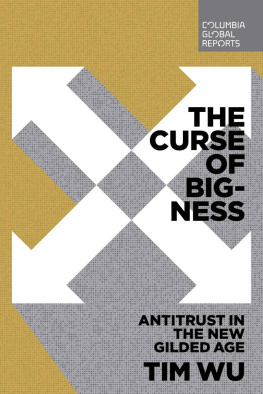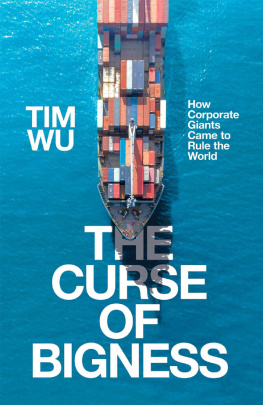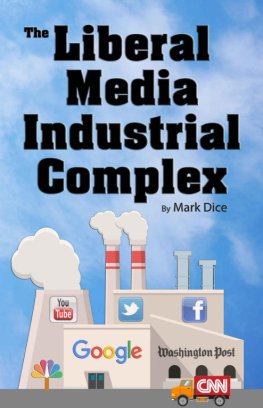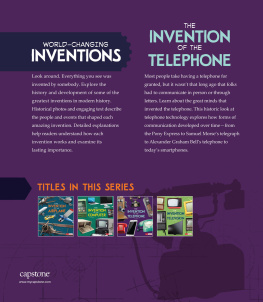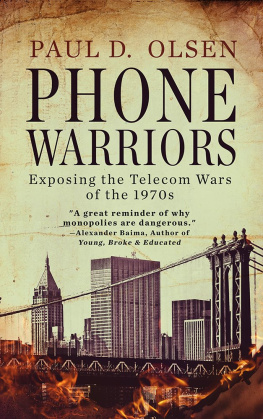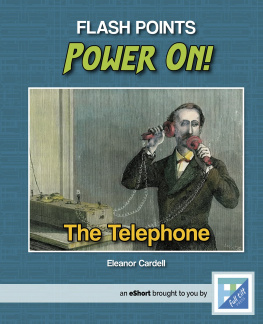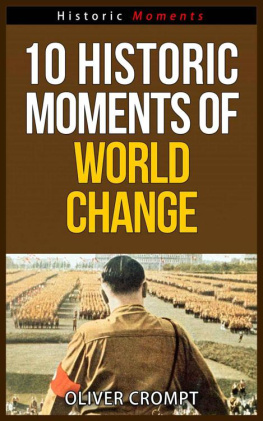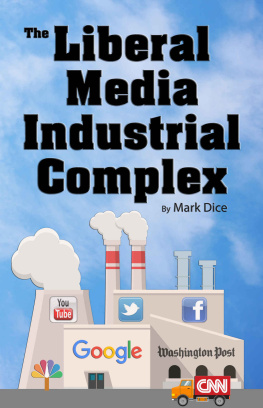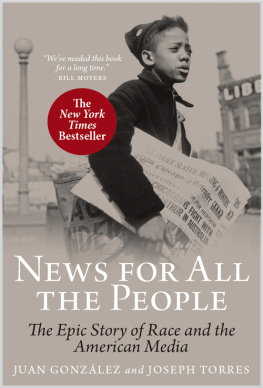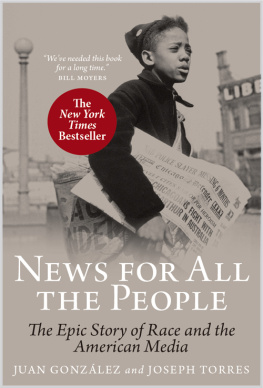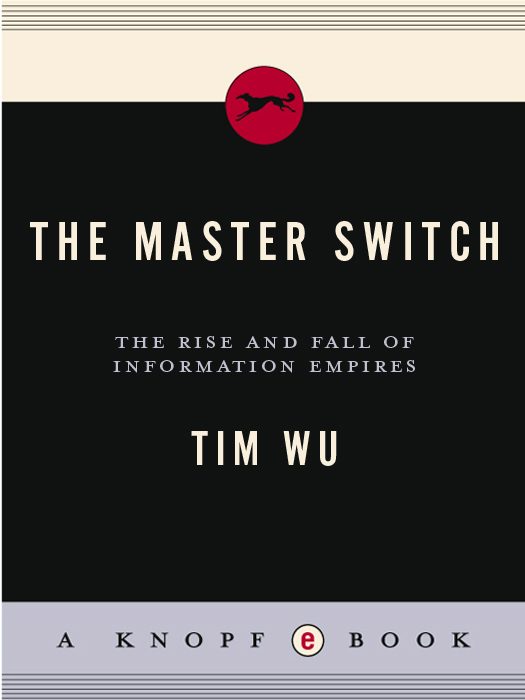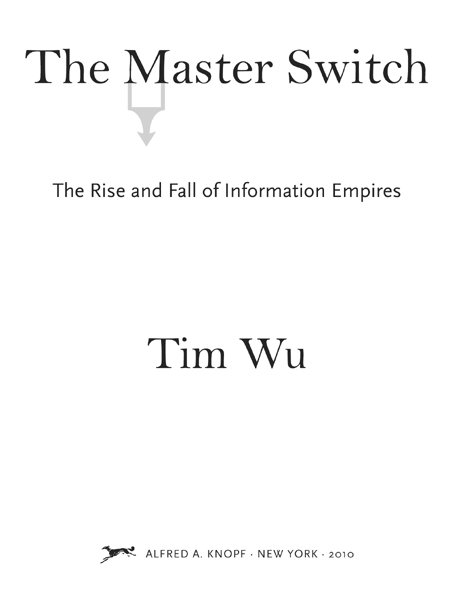THIS IS A BORZOI BOOK
PUBLISHED BY ALFRED A. KNOPF
Copyright 2010 by Tim Wu
All rights reserved. Published in the United States by Alfred A. Knopf, a division of Random House, Inc., New York, and in Canada by Random House of Canada Limited, Toronto.
www.aaknopf.com
Knopf, Borzoi Books, and the colophon are registered trademarks of Random House, Inc.
Library of Congress Cataloging-in-Publication Data
Wu, Tim.
The master switch : the rise and fall of information empires / Tim Wu.
p. cm.
eISBN: 978-0-307-59465-5
1. TelecommunicationHistory. 2. Information technology
History. I. Title.
HE7631.W8 2010
384.041dc22 2010004137
v3.1
For Kate
At stake is not the First Amendment or the right of free speech, but exclusive custody of the master switch.
FRED FRIENDLY

Every age thinks its the modern age, but this one really is.
TOM S TOPPARD , The Invention of Love
Contents
Introduction
On March 7, 1916, Theodore Vail arrived at the New Willard Hotel in Washington, D.C., to attend a banquet honoring the achievements of the Bell system. Hosted by the National Geographic Society, the festivities were of a scale and grandeur to match American Telephone and Telegraphs vision of the nations future.
The Willards dining room was a veritable cavern of splendor, sixty feet wide and a city block long. At one end of the room was a giant electrified map showing the extent of AT&Ts long lines, and before it sat more than eight hundred men in stiff dinner clothes at tables individually wired with telephones. Private power mingled with public: there were navy admirals, senators, the founders of Bell, and all of its executives, as well as much of Woodrow Wilsons cabinet. From the four corners of the country had come a countrys elite wrote the Societys magazine, to crown with the laurels of their affection and admiration the brilliant men whose achievements had made possible the miracles of science that were to be witnessed.
Then seventy-one years old, his hair and mustache white, Vail was the incarnation of Bell, the Jack Welch of his time, who had twice rescued his colossal company from collapse. As Alan Stone, Bells chronicler, writes, Few large institutions have ever borne the imprint of one person as thoroughly as Vails on AT&T. In an age when many industrial
Voice voyages was the theme of the Bell banquet. It would be a riveting demonstration of how AT&T planned to wire America and the world as never before, using a technological marvel we now take for granted: long distance telephone calls.
After dinner, the guests were invited to pick up their receivers from the phones resting on the table. They would travel over the phone line to El Paso, on the Mexican border, to find General John Pershing, later to command the American forces in World War I.
Hello, General Pershing!
Hello, Mr. Carty!
Hows everything on the border?
Alls quiet on the border.
Did you realize you were talking with eight hundred people?
No, I did not, answered General Pershing. If I had known it, I might have thought of something worthwhile to say.
The audience was visibly stunned. It was a latter-day miracle, reported the magazine. The human voice was speeding from ocean to ocean, stirring the electric waves from one end of the country to the other.
The grand finale was a demonstration of Bells newest and perhaps most astonishing invention yet: a wireless telephone, the ancestor of our mobile phone, of which, by 1916, Bell already had a working prototype. To show it off, Bell mounted what might be called one of historys first multimedia presentations, combining radio, the phonograph, the telephone, and the motion picture projectorthe most dazzling inventions of the early twentieth century.
Miles away, in a radio station in Arlington, a record player began The Star-Spangled Banner. The sound came wirelessly to the Willard banquet hall over the eight-hundred receivers, while a motion picture projector beamed a waving Old Glory onto a screen. The combination of sight and sound brought the guests to their feet with hearts beating fast, souls aflame with patriotism, and minds staggered. AT&T, it seemed, had powers to rival the gods: Perhaps never before in the history of civilization, opined National Geographic, had there been such an impressive illustration of the development and power of the human mind over mundane matter.
It may seem a bit incongruous to begin a book whose ultimate concern is the future of information with a portrait of Theodore Vail, the greatest monopolist in the history of the information industries, basking in the glories of the nations most vital communications network under his absolute control. After all, these are far different times: our own most important network, the Internet, would seem to be the antithesis of Vails Bell system: diffusely organizedeven chaoticwhere his was centrally controlled; open to all users and content (voice, data, video, and so on.) The Internet is the property of no one where the Bell system belonged to a private corporation.
Indeed, thanks mainly to this open character of the Internet, it has become a commonplace of the early twenty-first century that, in matters of culture and communications, ours is a time without precedent, outside history. Today information zips around the nation and around the globe at the speed of light, more or less at the will of anyone who would send it. How could anything be the same after the Internet Revolution? In such a time, an information despot like Vail might well seem antediluvian.
Yet when we look carefully at the twentieth century, we soon find that the Internet wasnt the first information technology supposed to have changed everything forever. We see in fact a succession of optimistic and open media, each of which, in time, became a closed and controlled industry like Vails. Again and again in the past hundred years, the radical change promised by new ways to receive information has seemed, if anything, more dramatic than it does today. Thanks to radio, predicted Nikola Tesla, one of the fathers of commercial electricity, in 1904, the entire earth will be converted into a huge brain, as
Each of these inventions to end all inventions, in time, passed through a phase of revolutionary novelty and youthful utopianism; each would change our lives, to be sure, but not the nature of our existence. For whatever social transformation any of them might have effected, in the end, each would take its place to uphold the social structure that has been with us since the Industrial Revolution. Each became, that is, a highly centralized and integrated new industry. Without exception, the brave new technologies of the twentieth centuryfree use of which was originally encouraged, for the sake of further invention and individual expressioneventually evolved into privately controlled industrial behemoths, the old media giants of the twenty-first, through which the flow and nature of content would be strictly controlled for reasons of commerce.
History shows a typical progression of information technologies: from somebodys hobby to somebodys industry; from jury-rigged contraption to slick production marvel; from a freely accessible channel to one strictly controlled by a single corporation or cartelfrom open to closed system. It is a progression so common as to seem inevitable, though it would hardly have seemed so at the dawn of any of the past centurys transformative technologies, whether telephony, radio, television, or film. History also shows that whatever has been closed too long is ripe for ingenuitys assault: in time a closed industry can be opened anew, giving way to all sorts of technical possibilities and expressive uses for the medium before the effort to close the system likewise begins again.


